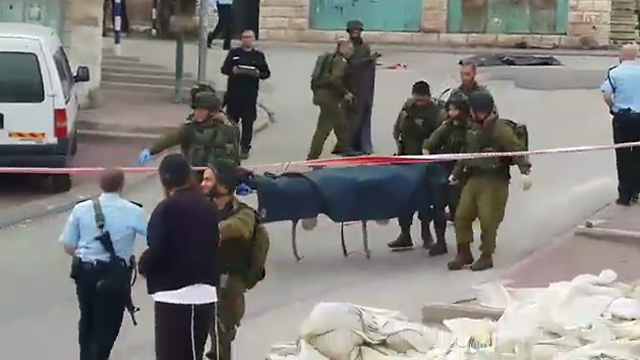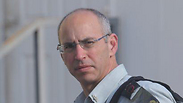
I exposed Elor Azaria’s lies, prosecutor says in first interview
Lieutenant Colonel (res.) Nadav Weisman, who was called up for reserve service to join the prosecution in the Hebron shooting trial, says it is the most important case he has ever handled. ‘There were those who tried to shatter our norms in this affair, but the court ruling preserved them. The attempt to break off from the truth is what filled me with a sense of mission,’ he states.
At the military court across the street, and beyond the General Staff headquarters, the head of the panel of judges, Colonel Maya Heller, read the sentence. The people stayed home, and those who did show up seemed to accept the punishment in advance. The mass dancing on the Castina Junction during the first remand hearing, and the violent clashes opposite the Azrieli Mall during the reading of the verdict, disappeared. Had the television channels not announced a live broadcast—there are hardly any viewers in the morning anyway—these protestors, members of the Lehava and Kahane Chai movements, would not have even bothered coming.
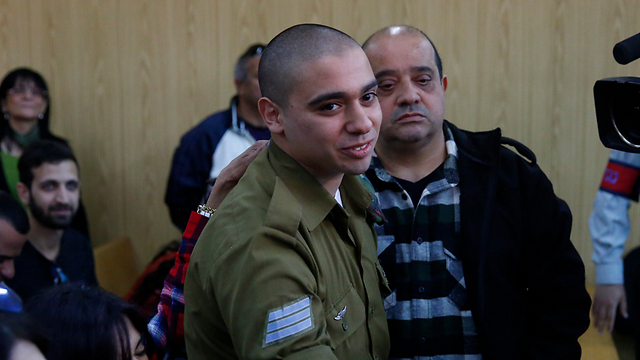
The most photogenic protestor was a guy named Ophir Pinhasi. He was wearing a Donald Trump mask with his long beard poking out underneath it, waving a yellow Chabad flag with a “Messiah” caption, displaying a “Kahane was right” sticker on his chest and holding a copy of “The King’s Torah,” the book which permits killing gentiles. The photographers surrounded him. Several minutes later, they got tired of him.
When Colonel Heller began reading the punishment, the audience had no idea what it was expected to do, whether it was time for a victory roar or for a cry of despair. There were four minutes of silence. Then someone shouted, “Sons of b*tches, emphasizing the B, and a woman joined in by screaming, “Disgrace, disgrace.” The rage wasn’t real. Like fake news, there is also fake rage.
Singer Ariel Zilber was called to perform the song he had composed for the event, for the fifth or sixth time. The words were defying, inciting, bordering on violence, but the rhythm was cheerful, flattering, like in a children’s song. Zilber would have made a great kindergarten teacher.
The prosecutor in the trial, Lieutenant Colonel (res.) Nadav Weisman bought tickets for the historic reunion concert of the Tamouz rock band, whose members included Ariel Zilber. He loved the band as a teenager. Because of the long discussions in the evidence stage of the trial, he was forced to give up on the concert. The trial also made him miss out on Zilber’s performance on the street on Tuesday. Someone sent a video of it to his cellphone. “Zilber has written much better songs,” he told me later.
Clear violation of the law
Weisman, 45, is a senior partner in a large, successful law firm, which specializes in commercial transactions. He was called up to join the prosecution as part of his reserve service. It was fascinating to watch him during the trial: The defense attorneys tried to forcibly drag him to the court outside, the street court, where the sympathy towards Azaria soared, where the publicity and the fame were. He wasn’t dragged and didn’t panic. When he began receiving frequent death threats, he was assigned a bodyguard. The security around him will continue when he returns to civil life as well.
The court ruling gave him a knockout victory. The question of what the trial leaves behind for the IDF and for the Israeli society is up for debate.
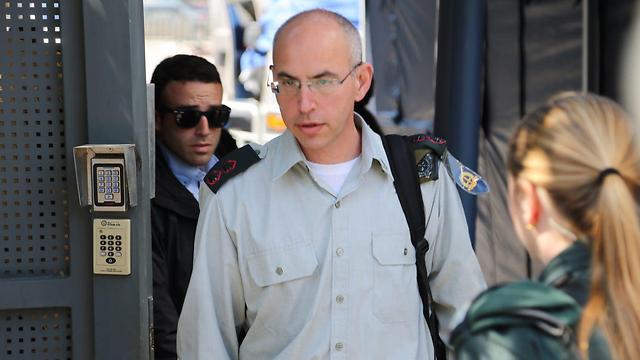
“It was, without a doubt, the most important case I had ever handled in my life,” he said when I met him at his office, several hours after the sentence was handed down. He compared the effect of the Azaria trial to the effect of the verdict in the Kafr Qasim massacre trial. “Judge Benjamin Halevy wrote that a blatantly illegal order is an order with a black flag flying over it. The soldier on the ground doesn’t know exactly what a black flag is, but he does know that there is a black flag, that there are red lines which must not be crossed.”
What did the trial teach you about the Israeli society, I asked.
“Like every citizen, I watched the film taken at the scene. The violation of the law is very clear. It was clear to me that Israeli society would be split in half—some would see the violation of the law, and some would see a combat soldier killing a terrorist and wouldn’t care about the rest. That’s a narrative that cannot be legally defended.”
But that’s an authentic narrative, I said. Many Israelis feel that way.
“Yes,” he said, “but the law is very clear. The attempt to justify the act in court was baseless. The defense argued that on the one hand, the terrorist was alive and dangerous, and that shooting him was therefore justified; but also that on the other hand, it claimed that he was dead, so the shooting made no difference. These are contradicting arguments.
“The attempt to break off from the truth is what filled me with a sense of mission. Now they are calling it alternative facts or post-truth—these are the terms dominating the world this year, and that’s what they tried to invent in this trial. You see something that is very clear, and they try to explain to you that it isn’t like that at all.”
I thought that alternative facts were what lawyers keep making up, I said. Your client was caught red-handed, and you claim, “My client wasn’t even there.” That’s your job.
“No,” he said, “that’s what people attribute to us. A lawyer’s most important asset is his credibility in front of the court. At the end of the day, a judge looks at both sides and asks himself, ‘Who do I believe?’
“We have a set of values that we believe binds us. It’s very easy to phrase values, to print them out on a poster and to hang the poster on the wall. The real test is the implementation. I told the judges, despite the sympathy towards the soldier, what happened here is not in the grey area—it’s in the black area. If we let Elor Azaria off without a punishment, we are basically saying that we have no values.
“The law says that a soldier can kill if he is obeying orders, but Azaria knowingly violated the orders. He is not a child. He is a soldier who served in the army for two years, an outstanding military medic. He was well aware of the rules of engagement, which were worded very clearly. As he said to his friend immediately after shooting, and as he said to the company commander, Tom Naaman, ‘He, the terrorist, stabbed my friend and he deserves to die.’ That was his motive.”
Then why didn’t you accuse him of murder, I asked.
“Because the evidence didn’t justify a murder charge,” he said.
Wasn’t it a political decision, I asked.
“Every move we made created resistance, went against the flow,” he said. “What was political about it? We made decisions based on professional considerations alone.
“During his testimony, Azaria portrayed himself as a hero—the only one who detected the situation. All his commanders failed, and he was the only one who saw the explosive charge, which wasn’t there. It was a lie, and we proved it was a lie. You see his behavior when the body of the terrorist he killed is evacuated. The body is placed on a stretcher and carried in front of the soldiers, including Azaria. He doesn’t warn anyone and doesn’t seem afraid. The first time he said that he had feared that the terrorist was carrying an explosive device was at noon, after he consulted a lawyer.”
Did you have any suspicions that the members of the Jewish community in Hebron had incited Azaria to shoot, I asked.
“That wasn’t the case,” Weisman said. “The offense was committed by Elor Azaria. It’s not the court’s duty to discuss the background of the incident. It’s a good thing that there is a public debate about the background, but Azaria is the only one who should have been prosecuted.”
The evidence presented in the trial reveals that the commanders failed to control the incident, I said. There was a lot of disorder.
“The disorder,” Weisman said, “was the subject of a military investigation that took place simultaneously. The mess did not change the mental element in the decision made by Azaria.”
Punishment is less important
You demanded a three-to five-year prison term, I said, and you got a year and a half.
“I don’t measure myself in percentages,” Weisman replied. “The main purpose of the legal proceedings is to outline norms for the entire population. The Supreme Court said that. The judges implemented that very well: Norms were set, the truth was told, the message was conveyed. It was made clear that pressure groups cannot deter the system from enforcing the law. The punishment is important, but it’s less important.”
A legal proceeding, I said, is not math: Each judge has their own world view. All the more so in the army: If Refael Eitan were chief of staff now, Azaria would have gone home a long time ago.
“It’s true,” he said. “A trial is not math, but in this case the facts are clear.”
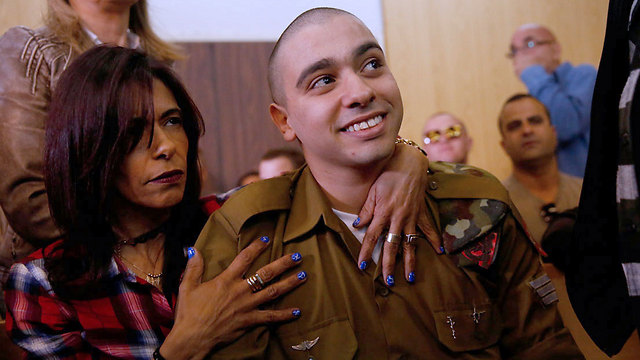
Did the statements made by then-defense minister Moshe Ya’alon and IDF Chief of Staff Gadi Eisenkot immediately after the shooting harm the prosecution, I asked. The judges reprimanded them in the sentence.
Weisman came to the chief of staff’s defense. “The commanders, led by the chief of staff, must take a moral stand in such a case and make it immediately clear,” he said. “It’s their job. I said that to the judges. As far as the army is concerned, this is an ongoing event. The army has to work, and it has to guide the soldiers on the norms we expect from them.
“When I watched the film, I noticed that the officer who had shot the first terrorist to death was missing. I asked him why he wasn’t there. He replied: ‘I wasn’t there because I had to go back and man my post at the Gilbert Checkpoint.’
“The claim that the statements made by the then-defense minister and the chief of staff influenced the judges is baseless. There are plenty of examples from the past that prove the military judicial system is independent. It isn’t influenced by things said by senior IDF commanders.”
Were you surprised by the politicians’ active involvement in the affair, I asked.
“I wasn’t surprised,” he said. “The affair gave them free publicity. Anyone seeking a headline got one.”
Recently, the politicians have been keeping a low profile, I said. Miri Regev, for example. It seems that once the headlines died out, she lost interest.
“It’s true,” he said. “After the verdict, the politicians drew away.”
The question, I said, is what will be left, if anything. Some have argued that because of the trial soldiers are afraid to shoot. IDF officials are convinced that that’s nonsense. Not a single incident has been recorded in which a soldier hesitated before opening fire when encountering terrorists; not a single soldier has claimed that he is afraid to shoot. That may also be true regarding the values and norms which the verdict seeks to instill. There has been no change in the attitude towards them either. The army is a body with a short memory. The soldier on the ground has no yesterday, and has no tomorrow either.
“That’s not true,” Weisman said. “Legal cases do change reality. The Alice Miller affair is a good example. A woman soldier petitioned the court because the IDF refused to let her join a pilots’ course. She won, was admitted into the course and was then declared unfit, but other girls followed in her footsteps and completed the course successfully, and today the army is proud of its female combat pilots and wants more.
“In the Azaria affair, there were those who tried to shatter our norms. The ruling maintained (those norms—ed). That’s why it’s so important. This case will be with us for many years to come.”
On the public side of the affair, I said, there were two more significant components. The knife intifada, which was at its peak at the beginning of the trial, emotionally swept away the Israeli street. Fear increased, hate increased, and the social media culture pushed towards Incitement.
“There is no doubt that these elements had an effect,” he said. “And there was another point: The trial was held at a fast pace. It was completely justified, but the result was that it was always in the headlines.”
Shooting because you need to
One of the issues which hovered over the trial was the question of authority, I said. The IDF fought for its authority to decide what a soldier is allowed and forbidden to do. The army was faced by politicians, rabbis, parents and the street.
“I’ll talk about it in a legal context,” he said. “Obeying orders is what legally defends the soldier. The commanders are the ones who issue orders and run the army.”
But the norm that has struck roots in the public, I said, is that soldiers are children. That they are not responsible for their actions.
“Soldiers are adults,” he said. “If the law is changed and they are cleared of responsibility, we will have no army. We will turn, like the chief of staff said, into an army of gangs.”
Weisman was not a combat soldier. He enlisted in the IDF as part of the academic Atuda program for young people who defer their military service in order to obtain an academic degree, and served as a prosecutor in the Military Advocate General. He learnt his first military lesson at the age of 11, in 1982, during the first Lebanon War.
“My father and uncles went on reserve duty in Lebanon then, and in the following years,” he said. “I remember what they said to me very well. ‘When you shoot because you feel you need to, you remain a human being. Once that need ends, you can go back to being a normative person, like you did before shooting.’”
But offenses committed on the ground don’t remain on the ground. “The assumption that someone shoots illicitly in the territories and then goes back to being an angel when he returns home is dubious. I studied the case of Gilad Shemen, a soldier who shot and killed a Palestinian girl, was prosecuted and won. His girlfriend, Einav Rogel, supported him throughout the trial. He murdered her in her bed in the kibbutz.”
A very calculated person
Weisman has never met IDF Chief Eisenkot. He hadn’t met Guy Hazut, the commander of the Kfir Brigade, either. Under the law, he was not allowed to have any contact with him. He first saw him when he was summoned to the court as a defense witness.
Hazut tried to reach a plea bargain behind the prosecution’s back, I said.
“He testified that he had acted without coordination,” said Weisman. “His meeting with the father was initiated by Ophir Sofer, a political person. We had no part in it.
“As a prosecutor, I can testify that no one has ever interfered in my work. I was appointed because people had faith in me, and this faith was preserved. Our work was a team effort. Throughout the trial, I was in touch with Chief Military Advocate General Brigadier-General Sharon Afek. We were in the same class and we are good friends. He gave me his full backing.”
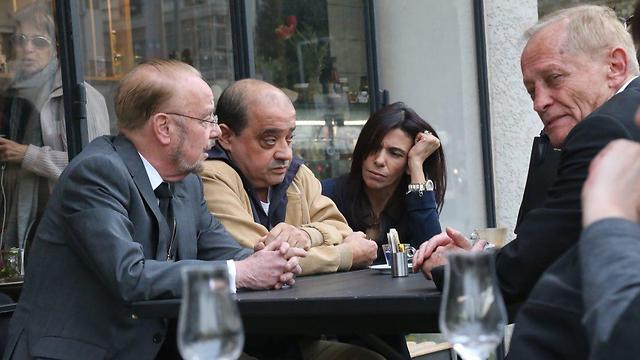
The defense team, I said, conducted a significant part of the trial outside, in front of the microphones. You seldom spoke.
“I was aware of the fact that the media had an influence,” he said, “but our decision was to conduct the trial in the courtroom, based on the evidence.”
You practiced restraint, I said.
“It was clear that the defense attorneys would try to get us to make mistakes,” he said. “We decided not to respond.”
What do you think about Elor Azaria, I asked.
“Apart from his lawyers and family members, I am the person he spoke to the most since the beginning of the trial,” he said. “I got the impression that he was a very calculated person, sticking to a prepared version, making no mistakes, not getting confused. On the other hand, he was unable to provide answers to difficult questions.”
You didn’t break him, I said.
“Defendants don’t break down in a cross-examination,” he said. “But in the investigation, I exposed the contradictions in his testimonies, the lies.”
The parents and the family members often reacted with emotional outbursts, I said.
“I assume that some of it was staged,” he said.
The family’s decision to appeal the conviction means that Azaria will remain in prison until the court ruling. The decision to add Adv. Yoram Sheftel to the defense team indicates that the next round will be filled with colorful headlines and political accusations.
Weisman told me that he had decided to choose a legal career while he was following the Demjanjuk Trial as a teenager. I reminded him that one of the defense attorneys in that trial was Yoram Sheftel. Were you that impressed with his performance, I asked. “Absolutely not,” he immediately clarified. “It wasn’t because of Sheftel.”










